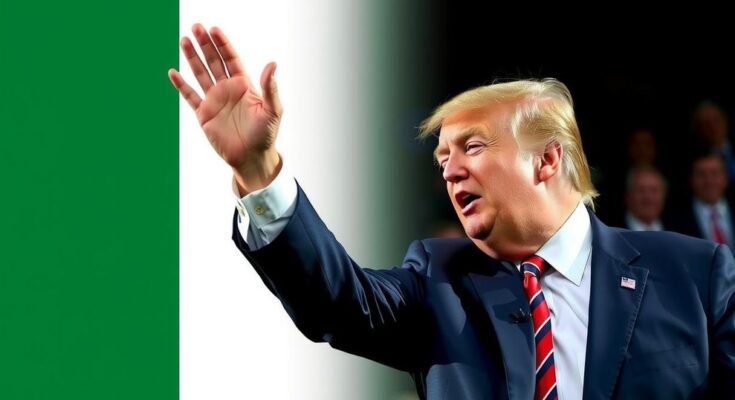Donald Trump’s election to a second term suggests significant changes for Nigeria, focusing on strict immigration policies and an ‘America First’ economic agenda. His victory may limit U.S. engagement with Africa, challenging Nigerian interests while impacting trade and migration. President Bola Tinubu has expressed hopes to deepen ties despite potential adversities arising from Trump’s policies.
Donald Trump’s recent victory in securing a second term as President of the United States has significant implications for Nigeria, the most populous nation in Africa. In his victory speech, Trump described his mandate as ‘unprecedented and powerful,’ indicating an intent to reshape U.S. foreign policy significantly. His campaign promises, primarily centered around the principles of non-interventionism and economic nationalism, raise concerns regarding how the African continent, particularly Nigeria, will be treated in terms of foreign aid, human rights, and immigration policies. Analysts suggest that Trump’s victory may result in Africa having to address its own needs, as the ‘America First’ agenda implies a withdrawal from external commitments. Notably, during Trump’s first term, he did not prioritize engagement with African nations, which raises questions about future relationships. Nigeria’s President Bola Tinubu has expressed hopes for strengthening ties with the U.S. despite concerns about potential anti-immigration policies that could adversely affect undocumented Nigerians in the U.S. Furthermore, Trump’s position on immigration is projected to create challenges for undocumented Africans, as he is likely to pursue stringent deportation policies. In addressing economic implications, experts indicate that Nigeria’s economic development could be hindered under a Trump administration due to its focus on American interests over the needs of developing nations. Additionally, his proposals for increased tariffs on imports could impact Nigeria’s trade dynamics significantly, as Trump aims to protect U.S. manufacturing. Regarding human rights, particularly concerning LGBTQ+ issues, Trump’s previous stance indicates a lack of alignment with the progressive human rights agenda, which is already a point of contention in Nigeria. Overall, the ramifications of Trump’s presidency for Nigeria involve a complex interplay of economic, political, and social dimensions portending a challenging relationship.
Donald Trump’s election victory holds considerable significance for Nigeria, particularly amid his previous administration’s policies that tended to favor American economic interests over international partnerships. His promises during the campaign of adopting an ‘America First’ stance suggest that he may de-prioritize foreign aid and intervention, compelling African nations, including Nigeria, to rely on self-sufficiency. The responses from African leaders illustrate a divided sentiment regarding potential changes in bilateral relationships with the U.S., reflecting apprehensions amongst Nigerians and other Africans regarding future immigration policies and economic collaboration. Trump’s past actions and statements regarding African countries create further uncertainty about his administration’s approach to critical issues such as human rights and trade.
In conclusion, Donald Trump’s recent win is likely to usher in a second term characterized by strict immigration policies, potential economic isolationism, and minimal engagement with African nations. Although President Bola Tinubu expresses a desire to strengthen relations, the foundational policies espoused by Trump may limit meaningful support for Nigeria. The broader implications include potential setbacks in trade, migration difficulties for undocumented residents, and a stark emphasis on domestic concerns over international collaboration, further complicating Nigeria’s path towards development and cooperation with the U.S. as its foreign policy becomes more insular.
Original Source: www.bbc.com




